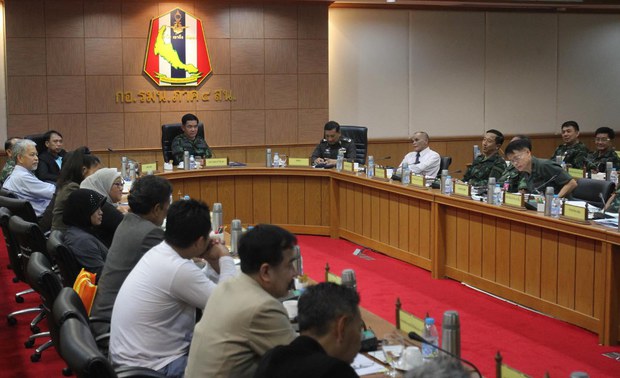Southern Thailand: Officials, NGOs Meet Over Controversial DNA Swabs
2015.08.11
 Thai government officials meet with NGO representatives and activists in Pattani province to discuss collecting DNA and other physical evidence from suspected Deep South insurgents, Aug. 11, 2015.
Thai government officials meet with NGO representatives and activists in Pattani province to discuss collecting DNA and other physical evidence from suspected Deep South insurgents, Aug. 11, 2015.
In the first meeting of its kind, officials from Thailand’s military-controlled government met Tuesday with NGOs in the restive Deep South to discuss how to gather evidence, including DNA and fingerprints, from suspected insurgents.
“I accept sage advice from all parties on how officials can implement this on the ground. Our officials are trying to adhere to human rights principles, as well as religious guidelines, when they search for targets,” Lt. Gen. Prakarn Cholayuth, commander of the 4th Army Region, told the meeting in Pattani province.
The meeting was a rare occasion when the Thai military openly addressed the controversial issue of taking DNA swabs, fingerprints and other evidence from people suspected of links to the southern insurgency. Since 2004, a separatist insurgency in Pattani and other border provinces that comprise Thailand’s Deep South has claimed more than 6,000 lives.
The issue has drawn criticism from rights advocates who have complained about authorities gathering DNA evidence, for example, by swabbing people’s cheeks without their consent.
“Some had to sign a release form without their genuine consent even though they didn’t understand the Thai script,” a former suspect who had been subjected to such treatment told BenarNews on condition of anonymity.
In early April, U.S.-based Human Rights Watch alleged that officials from Prakarn’s command had forced some 17 student activists from Princess of Naradhiwas University in nearby Narathiwat province to give them DNA samples. The students had been detained as part of an investigation into a car bombing in Narathiwat on Feb. 20.
DNA: A weapon against insurgents
In May, the Reuters news agency reported that DNA swabs were part of a new strategy by the junta to contain the southern insurgency. Since the new strategy was put into place, police in the Deep South have collected DNA samples from more than 40,000 people, Reuters quoted Maj. Gen. Anurut Kritsanakaraket, commander of the Southern Border Provinces Police Operation Center, as saying.
Apart from the controversy around consent, evidence collection techniques have at times offended religious sentiment in the Deep South, where a majority of the population is Muslim.
There have been complaints about authorities using dogs to sniff around religious sites and religious objects like the Quran, according to Tobrani Wisoot Binlatah, who heads the southern office of Sheikhul Islam, an organization that represents Thai Muslims.
Such a practice is unacceptable to Muslims, Tobrani told BenarNews. He did not attend Tuesday’s meeting, but Cross Cultural Foundation Director Pornpen Kongkajornkiat was there.
“It is up to the authorities to handle this issue with transparency to gain back public confidence. If people volunteer to have samples taken from them, that’s fine. But if not, that could create conditions for trouble to arise,” Pornpen told BenarNews.







